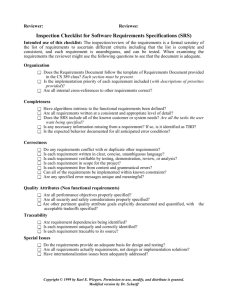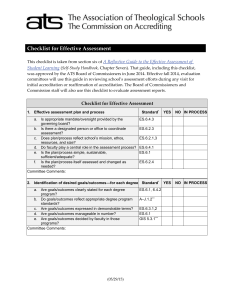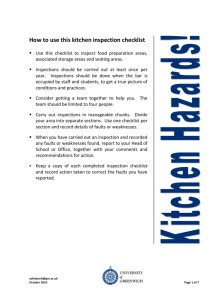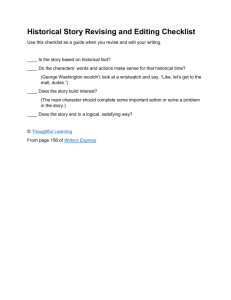IEE Checklist: Batching & Crushing Plant Environmental Report
advertisement
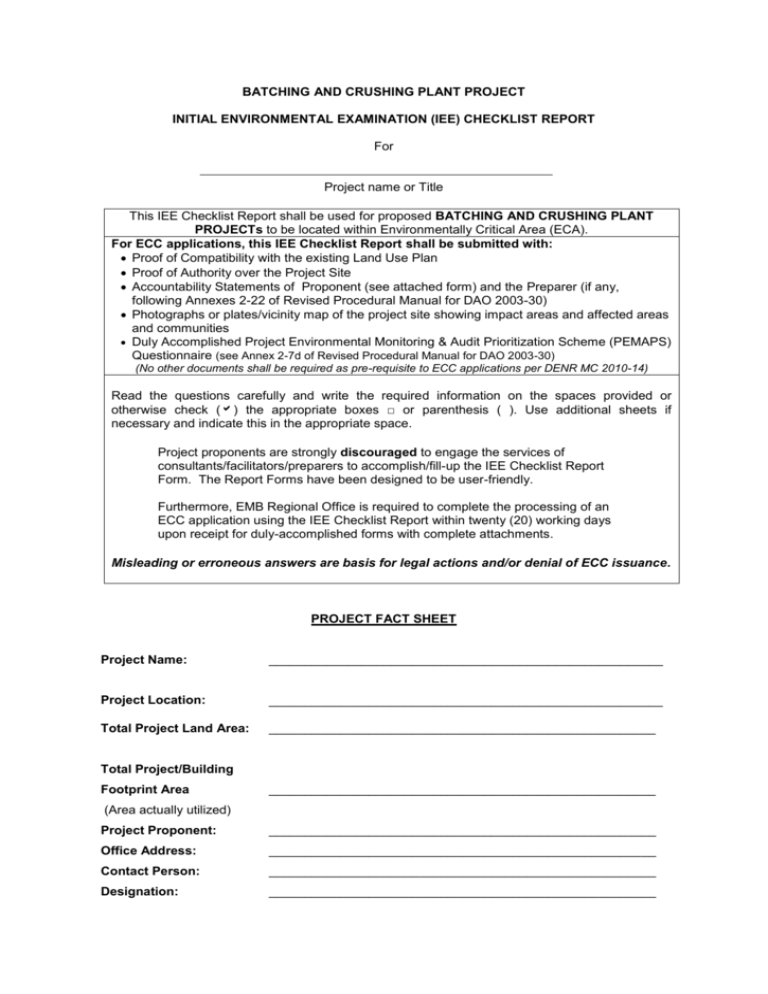
BATCHING AND CRUSHING PLANT PROJECT INITIAL ENVIRONMENTAL EXAMINATION (IEE) CHECKLIST REPORT For Project name or Title This IEE Checklist Report shall be used for proposed BATCHING AND CRUSHING PLANT PROJECTs to be located within Environmentally Critical Area (ECA). For ECC applications, this IEE Checklist Report shall be submitted with: Proof of Compatibility with the existing Land Use Plan Proof of Authority over the Project Site Accountability Statements of Proponent (see attached form) and the Preparer (if any, following Annexes 2-22 of Revised Procedural Manual for DAO 2003-30) Photographs or plates/vicinity map of the project site showing impact areas and affected areas and communities Duly Accomplished Project Environmental Monitoring & Audit Prioritization Scheme (PEMAPS) Questionnaire (see Annex 2-7d of Revised Procedural Manual for DAO 2003-30) (No other documents shall be required as pre-requisite to ECC applications per DENR MC 2010-14) Read the questions carefully and write the required information on the spaces provided or otherwise check () the appropriate boxes □ or parenthesis ( ). Use additional sheets if necessary and indicate this in the appropriate space. Project proponents are strongly discouraged to engage the services of consultants/facilitators/preparers to accomplish/fill-up the IEE Checklist Report Form. The Report Forms have been designed to be user-friendly. Furthermore, EMB Regional Office is required to complete the processing of an ECC application using the IEE Checklist Report within twenty (20) working days upon receipt for duly-accomplished forms with complete attachments. Misleading or erroneous answers are basis for legal actions and/or denial of ECC issuance. PROJECT FACT SHEET Project Name: _______________________________________________________ Project Location: _______________________________________________________ Total Project Land Area: ______________________________________________________ Total Project/Building Footprint Area ______________________________________________________ (Area actually utilized) Project Proponent: ______________________________________________________ Office Address: ______________________________________________________ Contact Person: ______________________________________________________ Designation: ______________________________________________________ Contact Information I. Telephone Number: _________________________________________ Fax Number: _________________________________________ Mobile Number: _________________________________________ E-mail Address: _________________________________________ PROJECT DESCRIPTION 1.1 PROJECT LOCATION AND AREA: Street Name, Barangay, and Municipality/City, Province ____________________________________________________________________________ ____________________________________________________________________________ ____________________________________________________________________________ See attached vicinity map/s and photographs of the project site and site development/layout plan. Geographic coordinates of the project area (Preferably use WGS 84 datum, otherwise specify datum used). Perimeter/Boundary points Longitude Latitude (based on OCT/TCT/etc) 1.2 PROJECT COMPONENTS Facilities 1. Raw material storage facility (e.g. aggregate, cement, etc.) 2. Fuel storage facility 3. Product storage facility / warehouse / stockpile 4. Processing facility (e.g. crushing, mixing, screening etc.) (please enumerate, use separate sheet if necessary) 5. Support Facilities (e.g. conveyor belt, generators, admin building, workers’ quarter, etc.) (please enumerate, use separate sheet if necessary) No. Of Units Area (sq. M.) / Capacity Specification/ Description / Remarks 6. Water source / supply 7. Waste water management Facility 8. Solid waste management facility 9. Drainage system 10. Others, specify _____________________ (Use additional sheets if needed) 1.3 UTILITIES/REQUIREMENTS (Operation Phase): Utilities Power/Electricity (Total) Power/Electricity (From Renewable Energy Sources) Water (Total) Source Estimated Demand/Consumption KWh KWh m3/day (Fill-up table below if water is not obtained from the local water utility) m3/day Water (Rainwater Collection System) Water Source [ ] ground water [ ] Surface water [ ] well [ ] river [ ] spring [ ] lake [ ] others: ____________________________ [ ] others: ____________________________ Location of water source ____________________________________________________________________________ (Sitio/Zone, Barangay, Municipality/City, Province, Region) Energy/Water Efficiency Utilities Power/Electricity Water Estimated Savings KWh m3/day Proposed Efficiency/Conservation Measures 1.4 MANPOWER a. Construction Phase Manpower Requirement Expertise/Skills Total b. Operation Phase Manpower Requirement Expertise/Skills Total 1.5 INDICATIVE PROJECT COST Project Cost (PhP): ______________________ II. ENVIRONMENTAL IMPACTS AND CLIMATE CHANGE RISK MANAGEMENT PLAN Possible Environmental/ Social Impacts Baseline Environment Preventive/ Mitigating Measures Monitoring Parameters/ Implementation and frequency Cost of Mitigation/ Monitoring LAND Consistency with land use Current land use w/in 1km radius (as per zoning ordinance): See attached proof of compatibility with land use Residential Commercial/ Institutional Industrial Agricultural/ Recreational Protected Areas Others, specify ______________ Actual land uses w/in 1km radius: Disturbance to wildlife due to vegetation clearing Residential Commercial/ Institutional Industrial Agricultural/ Recreational Protected Areas Others, specify ______________ Existing vegetation in the area: Forestland Marshland Grassland Mangrove Wetland Compliance with conditions of DENR/LGU SLUP, Tree Cutting Permit, ROW, PCA Permit Limit land clearing as much as possible Provide temporary fencing for vegetation that will be retained Promote restoration of damaged or Annual inspection of area replanted/ re-vegetated Cost integrated in the construction /operation cost Possible Environmental/ Social Impacts Baseline Environment Preventive/ Mitigating Measures Others, specify ____________ Change in surface landform/ topography/ terrain/slope Soil Erosion flat (0-3%) gently sloping to rolling (3-18%) Cost of Mitigation/ Monitoring destroyed vegetation where possible (e.g., tree planting); Slope: Monitoring Parameters/ Implementation and frequency steep (>18%) Provide erosion control and slope protection measures Designate a Spoils Storage Area, with topsoil set aside for later use and allow maximum re-use of spoils Construction during dry season Stabilization of embankment with grasses or other soil cover Regular inspection of slope protection measures in erosion-prone areas Regular inspection for new eroded areas near the site Slope/ Erosion Control Cost: ___________ Others, specify __________________ Others, specify _________________ Others, specify ____________ Is the project site located in an area identified by MGB/PAG-ASA/ PHIVOLCS as hazard prone? Soil/Land contamination due to improper solid waste disposal Yes No Existing soil type in the area: sandy clay sandy-loam Others, specify ____________________ Compliance with the DENR Administrative Order No. 2003-30 and DENR Administrative Order No. 2000-28, Implementing Guidelines on Engineering Geological and Geo-hazard Assessment (EGGA). Implementation of the Ecological Solid Waste Management Plan (ESWMP) Set-up temporary fence around the construction area Implement re-use and recycling of waste materials Implement proper segregation, collection and disposal of domestic wastes in designated areas Implement proper collection, labeling and storage of hazardous waste Daily inspection of waste/recycling bins for segregation Daily inspection for presence of mixed garbage in the facility Weekly inspection of waste accumulated Others, specify _________________ Cost integrated in the construction /operation cost Possible Environmental/ Social Impacts Baseline Environment Preventive/ Mitigating Measures Impairment of visual aesthetics Devaluation of land values Presence of visually significant landforms/landscape/structures? Yes No Monitoring Parameters/ Implementation and frequency Cost of Mitigation/ Monitoring Provide receptacles / bins for solid wastes Coordinate with the municipal / city waste collectors Engage third party company for waste collection Others, specify ________________ Implement landscaping and other beautification measures Provide adequate buffer Regular inspection of landscaping and other beautification activities Compensate adjacent property owners Others, specify ________________ Provide ring canals around fuelling tanks/ motor pool/ maintenance areas Set-up proper and adequate sanitary facilities Regular (ocular) inspection of water body for: Cost integrated in the construction/ operation cost Regular monitoring of buffer zones Regularly monitor for presence/absence of complaints from adjacent property owners WATER Increased siltation due to project activities Water quality degradation Others, specify _______________ Specify nearest/receiving water body: ____________________________ Distance to nearest/receiving water body: 0 to less than 0.5 km 0.5 to 1 km More than 1 km If nearest/receiving water body is fresh water, specify classification: AA A Strictly require the contractor and its workers to observe proper waste disposal and proper sanitation Strictly observe proper waste handling and disposal Provision of wastewater treatment facility (e.g. septic tank, oil and water separator, etc.) Set up silt trap/settling ponds to minimize downstream siltation Turbidity and/or silted condition Floating wastes or debris Cost integrated in the construction/ operation cost Possible Environmental/ Social Impacts Baseline Environment B Preventive/ Mitigating Measures C Monitoring Parameters/ Implementation and frequency Cost of Mitigation/ Monitoring Others, specify ______________ D If nearest/receiving water body is coastal or marine water, specify classification: SA SB SC SD Current Water Use: Competition in water use Depletion of water resources Fishery Tourist Zone / Park Recreational Industrial Agricultural Size of population using receiving surface water: ≤ 1,000 persons >1,000 and ≤ 5,000persons >5,000person Available/nearest water source. Implement rainwater harvesting and similar measures as an alternative source of water Observe water conservation measures; Others, specify _________________ Deepwell Water district/LGU Surface water Others, specify ________________ Regularly monitor for presence/absence of complaints Regular coordination with concerned agencies Regularly monitor for occurrences of water shortages Others, specify ________________ Cost integrated in the construction/ operation cost Possible Environmental/ Social Impacts Baseline Environment Preventive/ Mitigating Measures Monitoring Parameters/ Implementation and frequency Cost of Mitigation/ Monitoring Is the project site located in an area identified by MGB/PAG-ASA as flood prone? Increased occurrence of flooding Yes No Use appropriate design for project facilities Implement appropriate drainage system Limit the depth and area of workspace Regularly remove debris and other materials that may obstruct water flow Use appropriate technology (e.g. raised hand-pumps) to protect drinking water from flood contamination Others, specify ___________________ Regularly monitor for presence/absence of complaints Regular coordination with concerned agencies Regularly monitor for increased frequency of flooding Cost integrated in the construction/ operation cost Others, specify ____________________ AIR / NOISE Air quality degradation Distance to nearest community: 0 to less than 0.5 km 0.5 to 1 km More than 1 km Properly operate and maintain all emission sources (e.g. vehicles, generator, etc) Install when applicable, the appropriate air pollution control device/s Strictly enforce good housekeeping practices Control vehicle speed to lessen suspension of road dust Conduct water spraying to suppress dust sources and minimize discomfort to nearby residents Use covered vehicles to deliver materials that may generate dust Other, specify ___________________ Regularly monitor for presence/absence of complaints Regular (ocular) inspection of: Absence of white or black smoke from vehicles, generator, etc. Presence of truck cover during deliveries Quarterly monitoring of ambient air for the following: TSP PM10 NOx SOx Cost integrated in the construction/ operation cost Possible Environmental/ Social Impacts Baseline Environment Preventive/ Mitigating Measures Monitoring Parameters/ Implementation and frequency Nuisance due to noise generation Distance to nearest community: 0 to less than 0.5 km 0.5 to 1 km More than 1 km Properly operate and maintain all noise sources (e.g. vehicles, generator, etc.) Install when applicable, the appropriate noise control device/s (e.g., mufflers, silencer, sound barriers, etc.) Implement appropriate operating hours Provide adequate buffer (e.g. Perimeter planting of trees to serve as sound buffer and greenbelt) Cost of Mitigation/ Monitoring CO / CO2 Regularly monitor for presence/absence of complaints Cost integrated in the construction/ operation cost Regular monitoring of buffer zones Quarterly monitoring noise level Others, specify _____________________ PEOPLE Displacement of residents in the project site and within its vicinity Displacement of Indigenous People Enhanced employment and/or livelihood opportunities Reduced employment and/or livelihood opportunities Increased revenues for LGU Disruption/Competition in delivery of public services (e.g., education, peace and Size of population of host barangay: ≤ 1,000 persons >1,000 and ≤ 5,000persons >5,000person Classification of host barangay: Urban Rural Available services within/near the host barangay: Schools (e.g. elementary, high school, college) Health facilities (e.g., clinics, hospitals, etc.) Peace and order (e.g., police outpost, Brgy. Tanod, Provide relocation/disturbance compensation packages Prioritize local residents for employment Promptly pay local taxes and other financial obligations Regular coordination with LGU Prior consultation & coordination to minimize disruption on daily domestic activities & respect for IP rights and cultural practices Ensure participation of IPs in consultations and dialogues Provide appropriate traffic/warning signs, lighting, etc Others, specify _________________ Presence/Absence of complaints Regular coordination with LGU Others, specify _________________ Cost integrated in the construction/ operation cost Possible Environmental/ Social Impacts order, etc.) Enhanced delivery of public services (e.g., education, peace and order, etc.) Baseline Environment Preventive/ Mitigating Measures Monitoring Parameters/ Implementation and frequency Cost of Mitigation/ Monitoring Regular coordination with LGU Provide appropriate warning signs, lighting and barricades, whenever practicable Observe proper housekeeping Provide on-site medical services for any emergency. Participate in public awareness programs on health and safety etc.) Recreation and sports facilities Others, specify ___________________ Increase in traffic volume and worsening of traffic flow Impacts on community health and safety Others, specify _______________ Implement appropriate safety programs for both community and workers Strictly comply with fire, safety and similar regulatory requirements Strictly comply with requirements of RA 6969 Others, specify _____________________ Regularly monitor for presence/absence of complaints Regular coordination with LGU Regular submission of reports to concerned agency Others, specify ________________ Cost integrated in the construction/ operation cost III. ABANDONMENT /DECOMMISSIONING/REHABILITATION POLICIES AND GENERIC GUIDELINES (if Applicable) Project Life or Service: ___________ years Provide description of the Abandonment activities, such as, dismantling and waste disposal. _________________________________________________________________________________ _________________________________________________________________________________ _________________________________________________________________________________ _________________________________________________________________________________ IV. INSTITUTIONAL PLAN FOR EMP IMPLEMENTATION Organization Chart: 4.1. Abandonment Plan (if Applicable) Process flow Attach drawing/plan of pollution source and control installations (with dimensions and descriptions) SWORN STATEMENT OF ACCOUNTABILITY OF THE PROPONENT This is to certify that all the information and commitments in this Initial Environmental Examination (IEE) Checklist Report are accurate and complete to the best of my knowledge. By the authority vested in me by the ___ (Company Name) as ___(Position/Designation), I hereby commit to ensure implementation of all commitments, mitigating measures and monitoring requirements indicated in this IEE Checklist Report as well as the following: Conform to pertinent provisions of applicable environmental laws e.g., R.A. No. 6969 (Toxic Substances and Hazardous and Nuclear Wastes Control Act of 1990), R.A. No. 9003 (Ecological Solid Waste Management Act of 2000), R.A. No. 9275 (Philippine Clean Water Act of 2004), and R.A. No. 8749 (Philippine Clean Air Act of 1999). Abide and conform to LGU development plan and guidelines. Promptly pay local taxes and other financial obligations. Regularly submit reports to concerned agencies. I hereby bind myself to answer any penalty that may be imposed arising from any misrepresentation or failure to state material information in this IEE Checklist. In witness whereof, I hereby set my hand this ____ day of __________ at ______________________. __________________________ NAME OF PROPONENT HEAD (Position) (Company Name) SUBSCRIBED AND SWORN TO before me this _____ day of ____________ 201__, affiant exhibiting his/her Community Tax Certificate No. ___________________ issued at ______________________ on __________________________. Doc. No. Page No. Book No. Series of ____________________ ____________________ ____________________ ____________________
